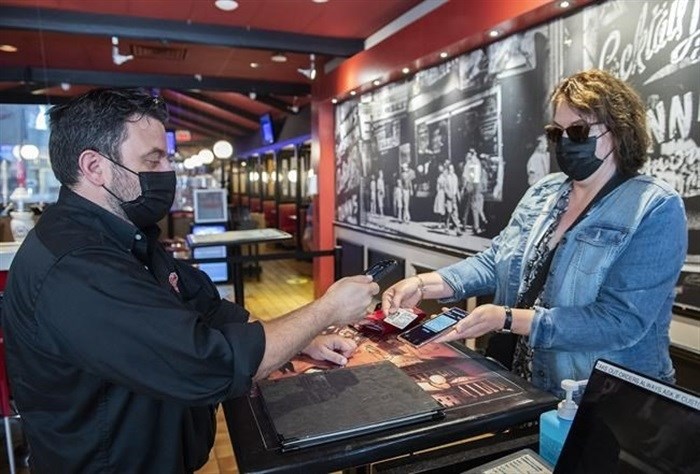
Jimmy Staveris, manager of Dunn's Famous restaurant, scans the COVID-19 QR code of a customer in Montreal, Wednesday, September 1, 2021. Vaccine passports are emerging as the latest pandemic minefield for restaurant workers in Canada, one riddled with verbal abuse, sexual harassment, racism and forged documents.
Image Credit: THE CANADIAN PRESS/Graham Hughes
October 17, 2021 - 8:00 PM
HALIFAX - When a proof-of-vaccine policy was announced, Juliana Murphy knew it would be another burden she'd face at work.
“I’ve had grown men yell and raise a fist at me just because of contact tracing,” says the waitress at a Halifax breakfast restaurant. “I knew asking them to show me proof of their COVID-19 shots would be worse.”
Vaccine passports are emerging as the latest challenge for restaurant workers in Canada, as many face verbal abuse, sexual harassment and racism from customers.
Restaurant staff across the country say while most customers are respectful of the new vaccine requirements, others are argumentative and angry.
They describe a work environment where they are routinely grilled about COVID-19 vaccine certification policies, with a small number of customers becoming belligerent and intimidating.
They describe the added work of enforcing COVID-19 restrictions as exhausting and stressful.
In response, some restaurant operators have hired security guards to review vaccination records and identification before allowing customers to sit at a table.
But in most cases, the responsibility falls to front-of-house staff — a largely young, part-time and low-wage workforce that’s already under strain from an industry-wide labour shortage.
“A lot of the hosts working at downtown restaurants are young women and it’s kind of scary for them to be essentially bouncing at the front door,” says Sean Bridge, a part-time server, bartender and host in Toronto. (The restaurants where Bridge and Murphy work are not being named to prevent them from being targeted by anti-vaccination efforts.)
“You can get a really ... arrogant crowd around here," Bridge says. "I hate that the onus of enforcing these rules has come down to restaurant staff.”
For an industry slammed by pandemic public health measures, the vaccine passport rules have been another blow for bars and restaurants.
While they're scrambling to stay open and doing their best to enforce the vaccine mandates, the restrictions have further increased the workload for staff and hurt sales, according to an industry group.
Restaurants Canada found in a recent survey that more than half of restaurant operators say their employees have experienced hostile confrontations from people opposed to the new rules.
The survey also found that 20 per cent of restaurants have lost staff and more than 60 per cent say they need to hire more workers.
“It’s restrictions on top of restrictions,” says Todd Barclay, president and CEO of Restaurants Canada. “It’s very labour intensive and time consuming to implement … restaurants are losing money.”
The industry group says restaurants should be compensated for the cost of enforcing vaccine mandates, which would help them hire more workers. It is also calling for capacity and distancing restrictions to be lifted now that vaccine requirements are being enforced.
Still, front-line restaurant workers suggest some customers may be forging vaccine records.
"I had one table that I overheard later in the evening say that they had forged their documents," says Bridge. "I had looked at their forgeries, and there’s zero way to tell they were fake."
On the flip side, he says he almost didn’t allow someone who had the Johnson & Johnson COVID-19 vaccine into the restaurant because he didn’t realize it only required one dose to be fully vaccinated.
"We’re trying to enforce these rules but we’ve had zero training," Bridge says. "It's a really uncomfortable situation to be in."
In Halifax, Murphy says her restaurant provided no training but left a pamphlet on the front desk about the proof-of-vaccine policy for staff to use as a guideline.
“The hard thing is, the vaccine records are different for every province,” she says. “It takes time to verify and some customers get upset. They really do believe it’s the restaurant imposing this.”
The waitress says while younger people, seniors and women generally tend to be understanding, she’s had multiple hostile interactions with middle-aged men.
“Some of them seem to take this as an opportunity to be racist,” she says. “I’ve repeatedly noticed that some customers give our Syrian and Indian employees a much harder time. They get really angry when they ask for their proof of vaccines.”
Murphy says she does her best to help de-escalate these situations, but that the amount of money she makes has dropped.
"By the time they get through the front door to my table, they're already in this horrible mood and complaining about things that have nothing to do with our actual restaurant service or quality. They've already made the decision that they're going to tip less."
This report by The Canadian Press was first published Oct. 17, 2021.
News from © The Canadian Press, 2021